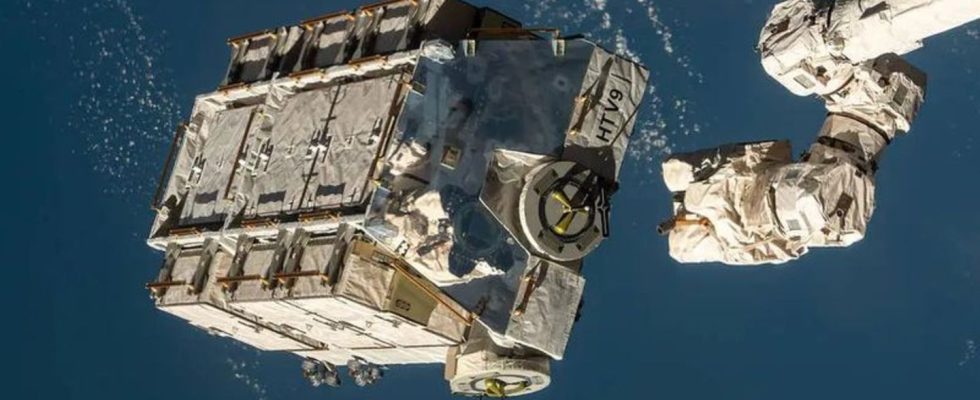Space travel
ISS battery block is expected to burn up – debris on the ground is possible
An external pallet with used nickel-hydrogen batteries is released by a robotic arm on the ISS. photo
© NASA/dpa
A discarded battery pack from the ISS space station has been flying around the earth for three years. Now it should burn up in the atmosphere. Some debris could reach the earth’s surface.
A discarded space station battery pack The ISS is expected to enter the Earth’s atmosphere on Friday evening and largely burn up. Smaller parts could reach the earth’s surface. However, experts from the German Space Situational Center and the German Aerospace Center (DLR), among others, believe it is very unlikely that debris will fall over Germany.
According to current calculations (as of Friday afternoon), the object could enter the atmosphere over the Caribbean – but other regions are also conceivable. The online site “satflare.com” specifies an eight-hour corridor around Friday evening German time as the time window. “Predictions about the time and place of re-entry are naturally associated with great uncertainty in such cases,” said the European Space Agency (Esa).
Burning block could be seen in the sky
The battery pack could also cause a small trail of fire over parts of Germany as it re-enters the atmosphere. “Around 7:20 p.m. it might be worth taking a look at the evening sky in the Lower Rhine and the Ruhr area,” said the military head of the Bundeswehr’s space situation center, Lieutenant Colonel Alexander Richter, to the German Press Agency early on Friday afternoon. At that point it was already dark and the sky was hopefully cloudless. ntv had previously reported on it.
Entry into the Earth’s atmosphere will lead to such strong friction that most of it will generally dissolve into heat and light. At around 7:20 p.m. the battery block will fly over North Rhine-Westphalia towards Cottbus in Brandenburg. A small trail of fire is likely. “It’s something special, but nothing dangerous,” explained Richter. In the event of a possible further orbit of the earth, there would be a second overflight corridor of the battery block over Germany, which could lead over Baden-Württemberg.
Crash into the sea?
If debris reaches the earth’s surface, it would probably fall into the sea, said Richter. “It’s not for nothing that Earth is called the blue planet,” he emphasized. In the current case it could be the North Atlantic or later the Indian Ocean. Richter expects that new calculations on the course of the battery pack will be available in the space situation center early on Friday evening. It is operated by the Air Force and the Space Agency at DLR.
The object is a pallet containing nine disused batteries from the International Space Station (ISS). The platform with battery packs is about the size of a car and weighs around 2.6 tons. It was detached from the ISS in March 2021 with the aim of later burning up in the atmosphere. According to the US space agency NASA, an average of one known piece has fallen to Earth per day over the past 50 years. So far, no serious injuries or significant property damage have been reported as a result.
The fact that the Federal Office for Civil Protection and Disaster Relief had distributed its assessment – there was a very low probability of debris in Germany – on Thursday via several warning apps via official danger information caused some excitement. “If the risk increases, you will receive new information,” it said. “We are concerned with transparency and sharing the information we have,” a spokeswoman for the authority explained the procedure when asked.

